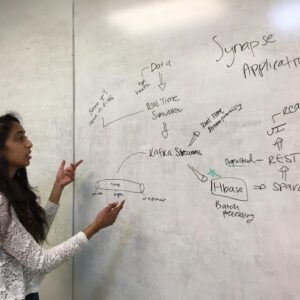In a Harker alumni chain reaction, following his employment at DoorDash, Barrett Glasauer ’09 has co-founded WanderJaunt, which partners with property owners to maximize value for short-term rentals.
Post-Harker, Glasauer went to the University of California, Berkeley, and picked up an electrical engineering/computer science degree. “While at college, I joined a fraternity, TKE [Tau Kappa Epsilon]” said Glasauer, “and made a bunch of friends who I’m close with to this day – and am lucky enough to have a number of them working with me at WanderJaunt.”
After graduation, Glasauer joined Palantir Technologies, a data analytics company, and led teams of engineers and data scientists helping protect clients from cybersecurity and fraud threats. “After 2.5 years at Palantir, I wanted to get closer to a true startup and reached out to Andy Fang (Harker Class of 2010) about openings at DoorDash,” said Glasauer. “He mentioned that they were starting up a business operations team, which sat at the intersection of data and strategy. It was a great fit for what I was looking for and I had a great time working with a bunch of other Harker alum, notably David Kastelman (Class of 2009), Rohan Chopra (Class of 2010) and Kevin Fu (Class of 2010).
“While at DoorDash, I met my two co-founders for WanderJaunt, Andres Green and Michael Chen. Andres was a general manager for the city of Boston and Michael was building out a bunch of our back-end merchant operations functions. They had a pretty terrible Airbnb experience during a DoorDash East Coast summit, and we got to chatting about how we’d do it better using what we’d learned building an operational tech company. That’s really the genesis of WanderJaunt – the belief that we could take our experience growing a three-sided marketplace at DoorDash with a ton of operational complexity and apply it to the short-term rental space.
“Airbnb, Homeaway, Expedia and all the rest of the online travel agencies (OTAs) had proven that people wanted to stay in homes over hotels when they traveled. The growth proved the fit was there, but the experience from both a host and a guest perspective was littered with inconsistency and operational complexity. It’s that inconsistency that prevented people like my parents from ever trying Airbnb. We believe that we can bring the best of both worlds together to create amazing guest experiences.”
The team finds properties to update and rent out by searching Trulia, Zillow, Craigslist and Redfin for properties available for rent. They also go direct to apartment buildings and lease a number of units at once, using multiple listing services to find properties that are about to go back into the rental market. “We also have acquired a significant chunk of our portfolio through referrals from people we manage properties for. It’s a pretty easy sell for most homeowners – more money, less work,” Glasauer noted.
“To get the properties ready, we have an internal activation team that handles everything from design, painting, furniture install to cleaning and photography,” Glasauer said. “We’ve basically got the process down to a point where we can have a property go from unfurnished to ready for guests within 10 days of us signing the lease. In order to facilitate this speed, we maintain a warehouse in each of our operational markets that stores 15-plus homes worth of furniture at a time to help us combat any lag in furniture delivery. When we first started two years ago, it would take us a full month just to get a single property ready. This November, we’ve managed to activate 20 individual properties.”
The company started out partnering with owners to operate their properties, but is evolving to maximize the use of company resources. “We’ve learned that our business model allows us to create much higher yields on a piece of real estate than owners would get in the traditional long-term market,” said Glasauer. “Looking into the future, we want to capture both the yield upside as well as the appreciation of the real estate asset. To do that, we’ve started raising a private equity real estate fund with the explicit purpose of buying and selling real estate. We expect to buy our first homes by Q2 of 2019.”
Glasauer is clearly a seeker of adventure! When asked what the scariest part of starting a company was, he replied, “Truth be told, I was more scared at the beginning of not taking the chance and I was fearful that if I didn’t take the leap, I would forever kick myself or wonder what could have been. For me, viewing the whole journey as a crazy learning experience that I wouldn’t get in any other company mitigates most of that ‘fear.'”
After all the planning and groundwork, it was exciting to actually open the doors of the first property, he said. “I think getting our very first guest was a huge moment for us,” said Glasauer. “It was the first validation that we could actually put something out there that people were interested in experiencing. I also think it resonated deeply with us that we were building the right thing when we got our first reviews where people said we gave them the best short-term rental experience they ever had or talked about how we helped their family get through things like a funeral or provided a great place to celebrate a birth.”
The journey has been thrilling as Glasauer grows into his management role. “To use a sports analogy,” said Glasauer, “when we first started out, I could be a player 100 percent of the time and it was super clear how outcomes were affected by my inputs. As I’ve played more and more of a team captain or a coach role as the [organization] has grown, the distance between my immediate inputs and the eventual outcomes that we deliver have also grown. It’s been personally challenging to feel like I have less control over the actual output since it requires a larger number of involved players to get to (reach?), but also incredibly rewarding to see super talented people working together to solve problems I never could on my own.”
The company is growing rapidly and WanderJaunt, like so many companies, is seeking good workers. “We would love to talk to software engineers and data scientists located in SF,” said Glasauer, “or folks who’d love to own a P&L [profit and loss concern] and help build the business from the ground floor by running entire markets in Phoenix, Austin and soon Chicago! Further, if anyone owns investment properties in the Phoenix or Austin area, I’d love to chat!”













